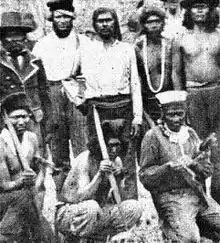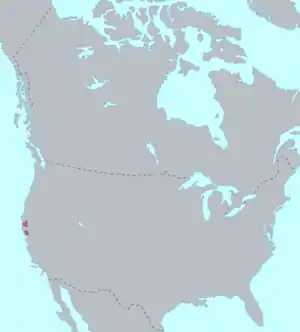Yuki people
The Yuki (also known as Yukiah) are an indigenous people of California, whose traditional territory is around Round Valley, Mendocino County. Today they are enrolled members of the Round Valley Indian Tribes of the Round Valley Reservation. Before the arrival of Europeans, the Yuki called themselves "Ukomno'om," meaning "valley people."[2] The exonym "Yuki" may derive from the Wintu word meaning "foreigner" or "enemy."[3]
 Yuki men at the Nome Cult Farm, ca. 1858 | |
| Total population | |
|---|---|
| 569 alone and in combination[1] (2010) | |
| Regions with significant populations | |
| Languages | |
| English, formerly Yuki | |
| Related ethnic groups | |
| Wappo people |
Yuki tribes are thought to have settled as far south as Hood Mountain in present-day Sonoma County.
History
In 1856, the US government established the Indian reservation of Nome Cult Farm (later to become Round Valley Indian Reservation) at Round Valley.[4] It forced thousands of Yuki and other local tribes on to these lands, often without sufficient support for the transition. These events and tensions led to the Mendocino War (1859), where US forces killed hundreds of Yuki and took others by force to Nome Cult Farm.[2]
Language

The Yuki language is no longer spoken. It is distantly related to the Wappo language,[5] forming the Yukian family with it. The Yuki people had a quaternary (4-based) counting system, based on counting the spaces between the fingers, rather than the fingers themselves.[6]
Population
Scholarly estimates have varied substantially for the pre-contact populations of most native groups in California, as historians and anthropologists have tried to evaluate early documentation. Alfred L. Kroeber estimated the 1770 population of the Yuki proper, Huchnom, and Coast Yuki as 2,000, 500, and 500, respectively, or 3,000 in all.[7] Sherburne F. Cook initially raised this total slightly to 3,500.[8] Subsequently, he proposed a higher estimate of 9,730 Yuki.[9]
Benjamin Madley wrote that "the Yuki suffered a cataclysmic population decline under United States rule. Between 1854 and 1864, settlement policies, murders, abductions, massacres, rape-induced venereal diseases, and willful neglect at Round Valley Reservation reduced them from perhaps 20,000 to several hundred."[2] In his work, Madley argues that Yuki history constitutes a clearcut example of genocide. He cites the fact that other than venereal diseases introduced by Europeans, stating that there is no evidence of any epidemic that would have caused such drastic population decline among the Yuki between 1854 and 1864.[2] The case of the Yuki thus challenges the idea that indirect effects of European colonization were the leading cause of population decline and mass death for Native Americans.
Intermarriage among neighboring tribes after their forced relocation to the Round Valley Reservation resulted in large numbers of Native Americans with mixed ancestry.[10] Many of these people are descendants of many local tribes and have come to be called Round Valley Indian Tribes.
In the 2010 census, 569 people claimed Yuki ancestry. 255 of them were full-blooded.
See also
References
- "2010 Census CPH-T-6. American Indian and Alaska Native Tribes in the United States and Puerto Rico: 2010" (PDF). www.census.gov.
- Madley, Benjamin. "California's Yuki Indians: Defining Genocide in Native American History". Western Historical Quarterly. 39 – via JSTOR.
- "Yuki Indian Family History". web.archive.org. 2007-02-10. Retrieved 2021-02-02.
- Rigler Creative Staff (2018-08-10). "When Native Americans Were Forcibly Removed From a Mendocino Indian Reservation". KCET. Retrieved 2020-01-19.
- "Yuki." Ethnologue. Retrieved 23 October 2012.
- Harrison, p.173
- Kroeber, p.883
- Cook, 1976 p.172
- Cook, 1956 pp.106, 108
- "Round Valley Indian Reservation History". web.archive.org. 2007-03-10. Retrieved 2021-02-02.
Sources
- Cook, Sherburne F. 1956. "The Aboriginal Population of the North Coast of California", Anthropological Records, 16:81-130. University of California, Berkeley.
- Cook, Sherburne F. 1976. The Conflict between the California Indian and White Civilization. University of California Press, Berkeley.
- Harrison, K. David 2007. When Languages Die. New York: Oxford University Press.
- Kroeber, A. L. 1925. Handbook of the Indians of California. Bureau of American Ethnology Bulletin No. 78. Washington, D.C.
External links
| Wikimedia Commons has media related to Yuki. |
- Four Directions Institute
- Round Valley history
- "Central California culture", Four Directions Institute